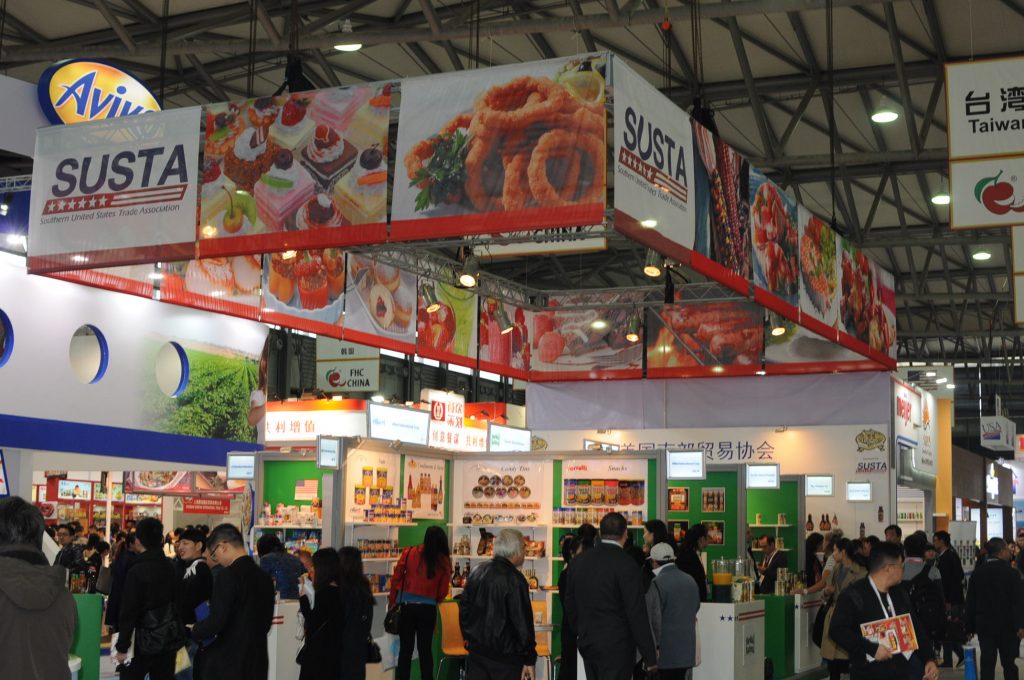3rd China Fresh Produce conference: a great success
The 23rd International Exhibition for the Food, Drink, Hotel, Restaurant, Foodservice, Bakery & Retail Industries and the 3rd FHC China Fresh Produce Conference closed on 14th November. The show was bigger than ever, hosting over 3,500 companies and 118,300 visitors from 48 countries. The Fresh Marketplace hosted by the Eurofresh Distribution Forum has taken place for the last three years and includes a very informative seminar on the industry’s current and upcoming trends, as well as opportunities to network with the biggest influencers in the industry. This year, Eurofresh focused on how to reach the end-consumers via best practices from omni-value chains.
Pierre Escodo (conference coordinator, editor of EUROFRESH DISTRIBUTION magazine and ASIAFRESH wechat portal) analysed China’s various retail channels and shared the best practices among local and international retailers. China imports of fresh fruit once again registered record growth (+26%), with almost 4.9 million tons of direct shipments, and close to 7 million tons including Hong Kong. The long-term growth is fuelled by Chinese consumers’ preference for imported produce, the strong growth of every distribution channel and the government policy of opening up to imports with new protocols. The US-China trade dispute is generating new opportunities for all the other fresh produce export countries around the globe to increase their market share in China.
Bian Ning (general operating manager of BENLAI.com) said,
“2019 has been an unprecedented year for China’s fruit market because of the large planting area, the good harvest and the varieties.”
During its seven years of brand marketing of agricultural products, Benlai has integrated various resources from agribusiness, the government, private enterprises and scientific research and institutions, built many high-quality agricultural product brands from scratch, and cooperated with more than 300 Chinese agricultural product brands.
Cathy Gao (vice president at Xianfeng Fruit Co.Ltd) explained how to build a customer-oriented fruit supply chain. XianFeng has 2,000+ offline stores and 1,500+ online stores, making it among the top-3 fruit chains in China. The retailer aims to reach 10,000 stores in three years, covering 60+ cities, and serving a population of 350 million. The firm has over 300 global partners participating in seeding, planting, packing, logistics, distribution and ripening, repacking and retailing, as well as 20 smart cold chain distribution centres nationwide to support its huge retail network.
Zhu Qi (vice president of 30+ Sanshijia fruit stores)
30+ is a fast growing new retail fruit chain based in southern China. Its aim of building a global fruit company is already on the right track, and already cooperates with worldwide brands such as Taylor for apples and Zespri and Dole for kiwis. Qi is proud of 30+’s professional purchasing and planting teams working in strategic partnerships with international associates such as the Chilean Cherry Association, the New Zealand Trade Bureau, and the Washington Apple Association.
Huang Jing (head of fruit supply chain at Fruitday & City Shop)
Fruitday was founded in Shanghai in 2009 as an E-platform for fresh produce. In 2018, Fruitday merged with Cityshop and became an omni-channel retailer. Despite the problems facing fresh E-platforms in recent years, Fruitday never lost heart, and has continued to provide good products with the best immersive shopping experience.
Björn van den Veen (CEO & founder of Arctic Solutions)
He shared the firm’s social media retail success based on studies using TIKTOK (DOUYIN) , WEIBO, TOUTIAO , WECHAT.
Su Xiuqing (vice-general manager of the largest Mongolian wholesale market Shiquanshimei Group)
The group was founded in 2000 but has a history that dates back 72 years. It is the largest group in Inner Mongolia specialising in distributing agricultural and livestock products. It supplies over 80% of the agricultural and livestock products of the 3.1 million residents of Hohhot, with an annual transaction volume of over 10 billion Chinese Yuan and an annual tax payment of more than 50 million Chinese Yuan.
The group imports fruits such as durian, mangosteen, dragon fruit, grape and longan, harvesting directly from source countries. Imported fruits are now being promoted at lower prices and with better quality in Inner Mongolia, which has driven increased demand.



